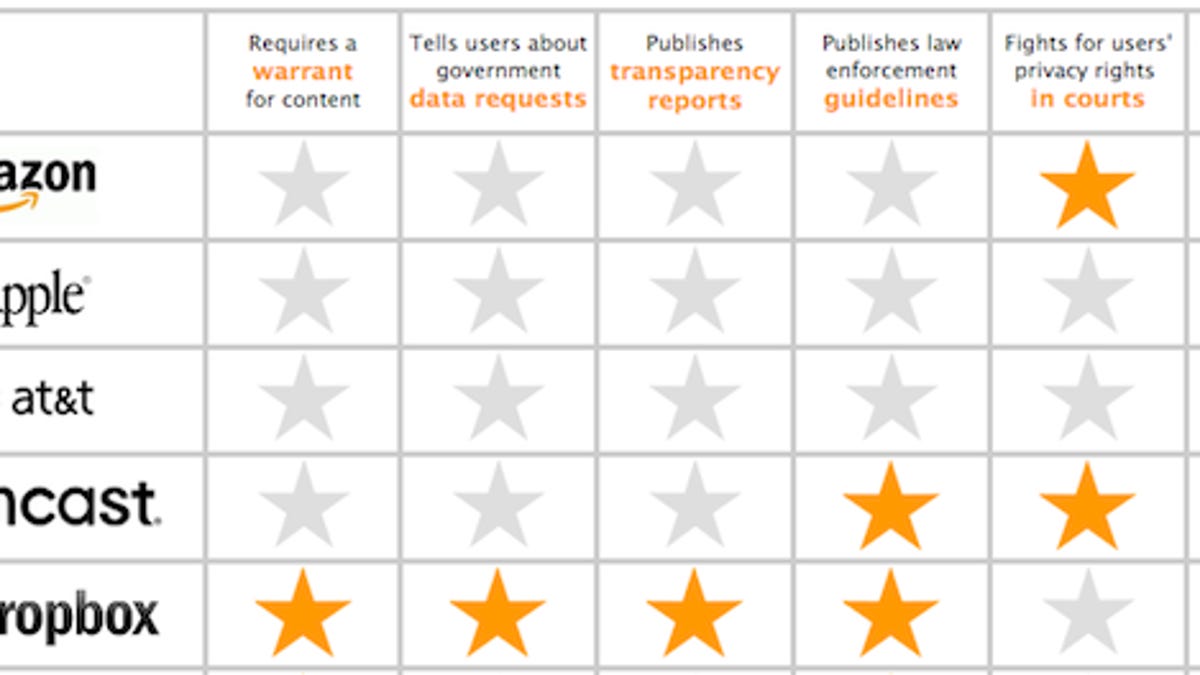Apple, Verizon earn poor marks in EFF privacy report
They're among a number of companies that disappoint with their privacy practices, according to the Electronic Frontier Foundation -- which likes what it sees from Twitter and others.
The Electronic Frontier Foundation is warning that some companies should not be trusted with your data -- but some should, and actively fight on the user's behalf.
Out of the 18 major Web and technology companies listed in the latest report from the U.S. privacy and civil liberties group, only six firms had five out of six stars rating how far they will go to either protect users from the government or even fight on their behalf in court.
The report published by the EFF (PDF) ranks the selected firms based on their privacy policies and law enforcement guidelines, but also how far they will go to protect users' data when a subpoena is issued and so on. The EFF also notes whether the company in question needs a warrant to be issued before it hands over data.
While Twitter and Sonic.net were the only two firms to have been given full marks by the privacy group, Verizon and MySpace were given none. Second to that, Yahoo, which was given just one star for fighting for its users in court, and AT&T and Apple, which fight for users in Congress, were also given one star.
According to the EFF, this isn't news. "MySpace and Verizon earned no stars in our report," it said. "We remain disappointed by the overall poor showing of [Internet providers] like AT&T and Verizon in our best practice categories."
Perhaps causing some conflicts, "Apple and AT&T are members of the Digital Due Process coalition" -- a group which attempts to clarify U.S. online snooping laws, such as the Electronic Communications Privacy Act (ECPA) -- "but don't observe any of the other best practices we're measuring."
Despite a data breach in 2011, Dropbox ranked as one of the most trusted firms by the EFF, as did LinkedIn, which suffered a separate albeit similar hack last year.
Microsoft also scored relatively highly thanks to its recent release of its first transparency report, following in Google's footsteps, following pressure from privacy groups regarding allegations of Chinese surveillance on Skype users.
But AT&T and Verizon, the two largest cellular firms in the U.S., with a combined customer base of around 220 million -- around two-thirds of the U.S. population -- rated extraordinarily badly.
"While there remains room for improvement in areas such as the policies of location service providers and cellphone providers like AT&T and Verizon, certain practices -- like publishing law enforcement guidelines and regular transparency reports -- are becoming standard industry practice for Internet companies," the EFF noted.
But this comes only recently after AT&T was once again embroiled in a controversy that effectively saw its customers' data being actively wiretapped by U.S. law enforcement agencies.
CNET's Declan McCullagh noted that senior Obama administration officials allegedly secretly authorized intercepting communications carried on AT&T networks and other Internet providers, despite it may be an illegal practice under federal wiretapping laws.
High marks for Twitter
Though your cell company may not stand up for your rights, Twitter does, being the operative silver lining to the report.
Twitter was singled out for defending its users in court. The microblogging service received respect for "standing up for its users" in the New York v. Harris case, which centered on the Occupy Wall Street protests. It was also the first company to publish in full its guidelines for law enforcement access and requests.
Google was also given a pat on the back for challenging the secretive National Security Letters.
These so-called "gagging orders" are being released in numerical ranges, as a way to avoid jeopardizing active investigations, but still opening up a level of transparency not seen before.
"We are also seeing a shift that we hope will be adopted across Internet companies more broadly: two Internet companies -- Google and Microsoft -- have published figures regarding National Security Letters, secretive government demands for user information that are typically accompanied by gag orders."
All in all, as a result of this, many companies have improved significantly ahead of the curve, adding pressure on those that haven't.
Google, Comcast and Twitter are the three major firms that earned two new stars this year, while Microsoft earned three. The report also highlighted that Foursquare went from zero stars in 2012 to four stars in 2013.
"We are extremely pleased to recognize the outstanding commitment each of these companies has made to public transparency around government access to user data," the report said.
This story originally appeared at ZDNet under the headline "Don't trust Apple, Verizon with your data, says EFF's privacy report."


